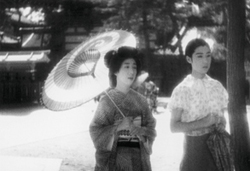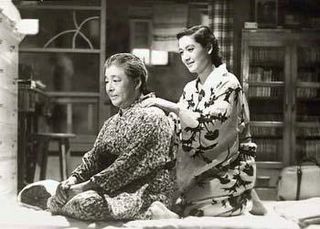Several things saved her. There was her longtime suspicion of evangelical life-changing experiences. There was her background in business journalism, which means she knows corporations will try anything to separate you from your money. There was the influence of her late father, whose passion for the English language would have had him walking out of the room when the leader used a nonword such as "impactful" or "ongoingly" (each time the Siren heard that second one, she found herself hand-to-forehead as if to ward off a physical blow). There was her basic cussedness.
But what probably saved her, as much as anything else, was Orson Welles and Citizen Kane.
Settle in, folks. This will be a long post.
For some forty hours over the course of three days, the Siren was in a room with a bunch of total strangers and heard some things they probably haven't told even their best friends. She even got up to the microphone herself. She made a handful of nice and probably useful discoveries about herself. She is presently trying to incorporate some of those into her life. Which wasn't bad before she took the Forum, but needed some improvement in some areas. Once she gets her head screwed back on straight, she will continue to work on those areas.
But the Siren is also majorly, majorly pissed off. The Landmark Education Forum is run on a pyramid model. Think of it like the old shampoo commercial. "So I told two friends, and they told two friends, and so on, and so on ..." as the screen divides up into an infinite number of models with great hair. Only Landmark isn't selling shampoo. Landmark is selling "transformation." But (here's the beauty part) if you want transformation, you have to transform other people, who show up to your "graduation" with credit cards and also invest in transformation by signing up for the Landmark Forum (C$500 including sales tax). And they tell two friends with credit cards, and they tell two friends with checkbooks, and so on, and so on, until the screen is filled up with an infinite number of transformed people with smaller bank balances.
As an alumnus of the world of capitalist journalism, I have to admit it's one hell of a business model.
Back in New York City, I encountered some people who took this thing. More than I really wanted to encounter, to tell you the truth. The hard-core Forum acolytes spout a lot of stuff about how it will change your life. That is pretty much all they spout, which is why conversations with them tend to be dull. But they're thin on the details. They say you have to experience it to understand it.
I hope most of my patient audience will agree that you don't have to experience everything to understand it. Why else do we go to the movies? I have never experienced desperate poverty, but when I watch Pather Pachali I understand perfectly well that it is horrible. Let the Siren save you C$500 (I think it's about $350-$400 in the States). Here's the Forum, blow by blow.
You settle in with about 150 other transformation-seekers. You hear a lot of rules. The three sessions run from 9 a.m. to anywhere from 10 p.m. to midnight. You get two half-hour breaks and one ninety-minute meal break. Why does it take so long? According to your energetic Forum leader, because it does. Say hello to tautology, tell it to pull up a chair and get comfortable.
You get the dictionary definition of integrity, then you're told it's really about keeping your word ("being your word," in Forumspeak). You're told to be on time (okay, not a problem), not to take notes (some of this stuff looks mighty goofy written down, as the Siren's readers are about to discover), not to talk amongst yourselves (familiar from grade school, also has the advantage of stopping any "wow, that's mighty goofy" conversations).
So here's the talk.
1. All meaning is derived from language. Life is empty and meaningless.
2. Because all of life is meaningless, events have no intrinsic meaning. There is what happened (your mother beat you, your wife ran away with the mailman, your children haven't spoken to you since the Reagan administration). And there is your interpretation (your mother was an abusive cow, your wife was a slut, your children are ungrateful brats). People collapse the events with their meaning. We are meaning-making machines.
3. People deal with life by developing persistent complaints, or "rackets." Your racket reinforces your need to look good, your need to be right by making other people wrong. You are inauthentic with people. You don't tell them what's really happening.
4. If you can look at the events as simply events, you will be free of them. You call a new and powerful mode of existence into being. And you can enroll other people in those possibilities. You do it by getting them to hand over their money and go to the Forum.
Are you still awake? The Siren was nodding off, but pay attention. We've been told that meaning is derived from language. But have you noticed that Landmark is creating its own language? Landmark is a neologism-making machine. And you have to love the fact that they took the great word racket, meaning a dishonest business, and instead coupled it to the little things that drive you crazy about life. Landmark isn't a racket. Landmark is freeing you from rackets. Either you "got it," and understand the concept, or you are being "resistant."
So that's the gist. It gets repeated over and over again, until your ass is numb and your mind is reeling. There's some other stuff, like an exercise in which you are supposed to close your eyes and be afraid, of the person sitting next to you, of everybody in the room, of everybody in Toronto, then everybody in Canada. This did nothing for the Siren because try as she might, she couldn't see anything frightening about Canadians.
Anyway. During the Forum, you are encouraged to call people that you are "incomplete with," Landmarkspeak for "pissed off at" or "have wronged." You're encouraged to tell them you have been inauthentic, and "share the possibility" that you could create a new phase in your relationship.
Why, that's sweet, isn't it? How is that sinister? It isn't. Except, that isn't the whole story.
When you call, you're also supposed to share the Forum experience. And later on you're supposed to share it with bloody everybody you've ever met.
The interesting part of the Forum doesn't come from listening to your leader yack. The interest comes from seeing people get up and "share" about their lives. And pretty awful some of them are, too. It's amazing how much suffering one room can contain. And, the leader told us Sunday night, look at it now! It's gone! isn't that amazing? How do we know it's gone?
Because we say it's gone. It was just a story. Your interpretation of events.
Got that? The Siren almost got it. She was sitting there Sunday afternoon, actually wondering if she should go to the "graduation," though the real purpose of the evening is to bring others to sign up for the Forum and maybe sign up for more Landmark stuff yourself, at steadily increasing prices.
Then the leader brought up Citizen Kane.
How many people had seen Citizen Kane, he asked. A gratifying number of hands were raised (the Siren was worried about that). He proceeded to summarize the movie. The opening death scene, Kane uttering the single word "Rosebud," the globe falling from his hand and shattering. The arc of Kane's life, as he goes from lonely little boy to newspaper magnate endlessly acquiring things and objects. The magnitude of Kane's failure. Then, the great shot where the camera zooms in and reveals the sled Kane had ridden long ago, the one he threw at the man who came to take him away to school. The camera lingering as the fire in the furnace consumes the sled. The leader said, here the audience realizes that Kane had spent his entire life trying to recapture a moment from his childhood. Kane's life had been empty and meaningless, the leader said.
Okay. Welles himself described Charles Foster Kane as "a hollow man." But the Siren snapped to attention and said to herself, wait a minute.
Citizen Kane is a tragedy at its core, meant to evoke pity and terror. The Landmark Forum certainly can cause terror, although that works better in Toronto if you're scared of Canadians. But there's no pity. What happened to you, to anyone, is a story. The Forum leader would have looked at Kane, after the wrenching scene where he trashes Susan's room, and said, "She left you. That's what happened. Your rage and pain is just a story. It doesn't mean anything. The meaning is just what you attach to it." All the feeling, all the compassion the movie has for its characters, is impossible in a Forum-ized world.
And there's more.
Female reporter: If you could've found out what Rosebud meant, I bet that would've explained everything.
Thompson: No, I don't think so. No. Mr. Kane was a man who got everything he wanted and then lost it. Maybe Rosebud was something he couldn't get, or something he lost. Anyway, it wouldn't have explained anything. I don't think any word can explain a man's life. No, I guess Rosebud is just a piece in a jigsaw puzzle. A missing piece.
Yes, after this scene the audience finds out what Rosebud means. But the reporter Thompson is still right. You can't reduce the mystery, poignance and failure of Charles Foster Kane to one word. Kane wasn't all about getting back to Rosebud. There was a great deal more to him, more than anyone could ever know. The complexities of human beings can't be reduced to one word. They can't be reduced to a bunch of "powerful" "possibilities" and jargon, either.
So the Forum leader viewed one of the pinnacles of American art, and missed the whole goddamned point.
And the Siren said, there's no way I am going to my "graduation."
Last night, I spoke to a dear friend as I tried to decompress from the whole Landmark experience. I told him that one of the most outrageous aspects of Landmark, to me, was the presence of volunteers at the Forum. Volunteers? At a for-profit company? I told my friend that I liked some of Ang Lee's movies, but that doesn't mean I am going to go down to his set and volunteer to do stuff like hold the door open.
My pal chuckled. "But you'd hold the door open for Welles," he said.
"After this weekend," I replied, "you bet I would."











